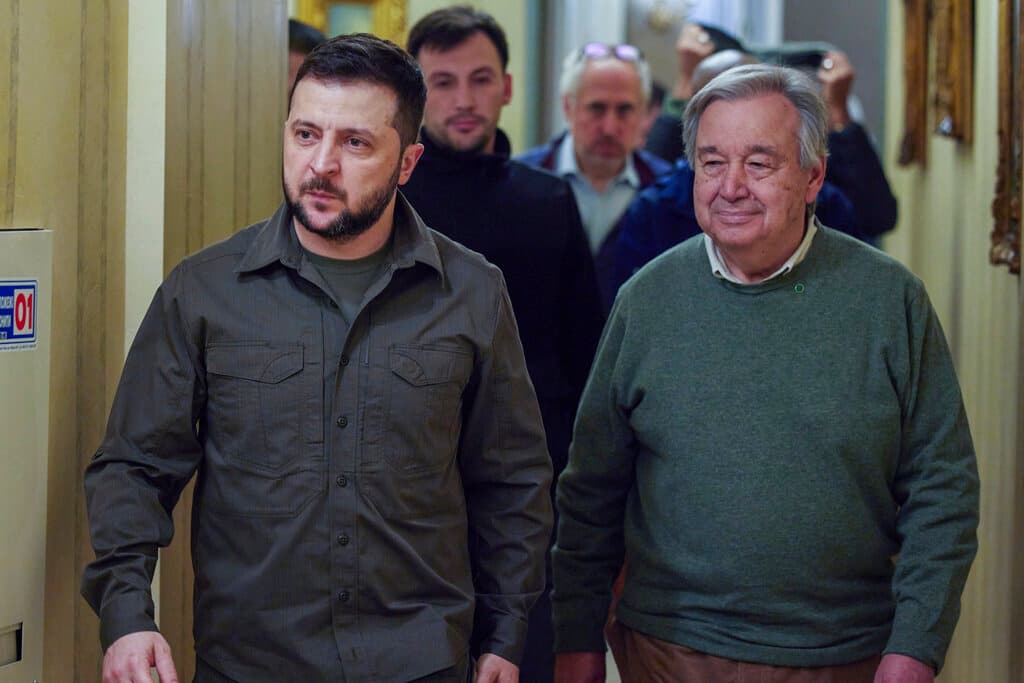Zelensky Calls for Tough Response on Kyiv Strikes
Britain will conduct large-scale exercises across Europe — from Finland to Northern Macedonia — to reinforce the warning to the Russian president not to attack NATO territories.

The Ukrainian capital, Kyiv, was thrust back into the spotlight following Russian missile strikes there yesterday during a visit by the United Nations secretary-general, Antonio Guterres.
Five rockets shook the central Shevchenko district and one of them struck the lower floors of a 25-story residential building, wounding at least 10 people, according to Ukraine’s emergency services.
The blasts are the boldest attack on Kyiv since Russian forces retreated weeks ago. Ukraine’s president, Volodymyr Zelensky, said the attack required an “appropriate, powerful response.” The bombardment came barely an hour after Mr. Guterres, who toured some of the destruction in and around Kyiv and condemned Russian attacks on civilians, completed talks with Mr. Zelensky.
Russia pounded targets all over Ukraine on Thursday, with explosions reported at Polonne in the west, Chernihiv near the border with Belarus, and Fastiv, a large railway hub southwest of the capital. The mayor of Odessa, in southern Ukraine, said rockets were intercepted by air defenses.
Ukrainian authorities also reported intense Russian fire in the Donbas — the eastern industrial heartland that the Kremlin says is its main objective — and near Kharkiv, a northeastern city outside the Donbas that is seen as key to the offensive.
Amid the backdrop of a war that appears to be spiraling out of control, Britain has announced that it will be sending 8,000 troops to Eastern Europe in one of the largest deployments since the Cold War. The Telegraph reported that Britain will conduct large-scale exercises across Europe — from Finland to Northern Macedonia — to reinforce the warning to the Russian president, Vladimir Putin, not to attack NATO territories.
As part of the operation, dubbed Exercise Hedgehog, British forces will join 18,000 NATO troops on the Estonia-Latvia border, while 1,000 soldiers have been sent to Poland under Exercise Defender. There have been 2,500 paratroopers sent to North Macedonia on Exercise Swift Response.
In the ruined southern port city of Mariupol, Ukrainian fighters holed up in the steel plant that represents the last pocket of resistance said concentrated bombing killed and wounded more people. Authorities warned that a lack of safe drinking water inside the city could lead to outbreaks of deadly diseases such as cholera and dysentery.
In Zaporizhzhia, a crucial way station for tens of thousands of Ukrainians fleeing Mariupol, an 11-year-old boy was among at least three people wounded in a rocket attack that authorities said was the first to hit a residential area in the southern city since the war began. Shards of glass cut the boy’s leg to the bone. The boy’s father, Vadym Vodostoyev, said: “It just takes one second and you’re left with nothing.”
The fresh attacks came as Mr. Guterres surveyed the destruction in small towns outside the capital that saw some of the worst horrors of the first onslaught of the war. He condemned the atrocities committed in towns like Bucha, where evidence of mass killings of civilians was found after Russia withdrew in early April in the face of unexpectedly stiff resistance.
“Wherever there is a war, the highest price is paid by civilians,” the U.N. chief lamented.
In the attack on Kyiv, explosions shook the city and flames poured out the windows of the residential high-rise and another building. The capital had been relatively unscathed in recent weeks since Moscow refocused its efforts on the Donbas.
The explosions came as residents have been increasingly returning to the city. Cafes and other businesses have reopened, and growing numbers of people have been out and about, enjoying the spring weather. It was not immediately clear how far the attack was from Mr. Guterres, but remarks from a Ukrainian official appeared to indicate that explosions could be heard overhead.
Getting a full picture of the unfolding battle in the east has been difficult because airstrikes and artillery barrages have made it extremely dangerous for reporters to move around. Several journalists have been killed in the war, now in its third month. Also, both Ukraine and the Moscow-backed rebels fighting in the east have introduced tight restrictions on reporting from the combat zone.
